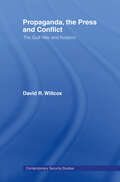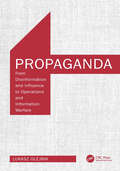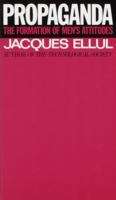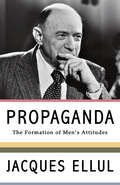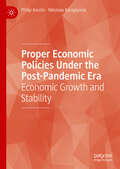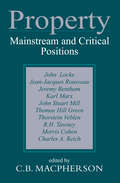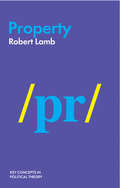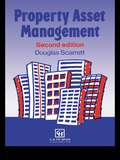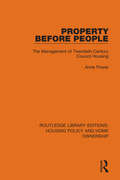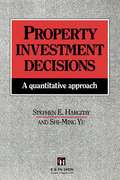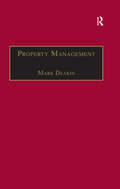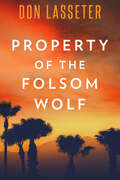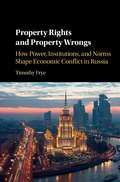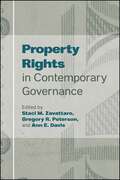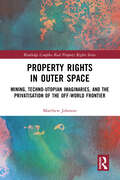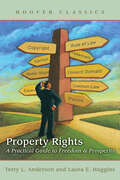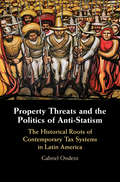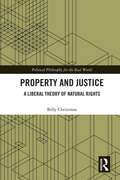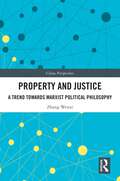- Table View
- List View
Propaganda, the Press and Conflict: The Gulf War and Kosovo (Contemporary Security Studies)
by David R. WillcoxAn incisive analysis of the use of the press for propaganda purposes during conflicts, using the first Gulf War and the intervention in Kosovo as case studies. As the contemporary analysis of propaganda during conflict has tended to focus considerably upon visual and instant media coverage, this book redresses the imbalance and contributes to the growing discourse on the role of the press in modern warfare. Through an innovative comparative analysis of press treatment of the two conflicts it reveals the existence of five consistent propaganda themes: portrayal of the leader figure, portrayal of the enemy, military threat, threat to international stability and technological warfare. As these themes construct a fluid model for the analysis and understanding of propaganda content in the press during conflicts involving British forces, they also provide the background against which the author can discuss general issues regarding propaganda. Amongst the issues which have become increasingly relevant to both recent academic debate and popular culture, the author tackles the role of the journalist in war coverage, the place of the press in a news market dominated by 'instant' visual media and the effectiveness of propaganda in specific cultural and political context. This book will appeal to advanced students and researchers in war studies, media studies/propaganda and psychology.
Propaganda: From Disinformation and Influence to Operations and Information Warfare
by Lukasz OlejnikThe book is a modern primer on propaganda—aspects like disinformation, trolls, bots, information influence, psychological operations, information operations, and information warfare. Propaganda: From Disinformation and Influence to Operations and Information Warfare offers a contemporary model for thinking about the subject.The first two decades of the 21st century have brought qualitative and quantitative technological and societal changes, and the subject of information influence needs to be re-ordered. Now is the time.The book explains the origins of the meaning and phenomenon of propaganda—where it came from and how it has changed over the centuries. The book also covers modern methods, including artificial intelligence (AI) and advertising technologies. Legal, political, diplomatic, and military considerations ensure that the material is covered in depth.The book is recommended for security and cybersecurity professionals (both technical and non-technical), government officials, politicians, corporate executives, academics, and students of technical and social sciences. Adepts with an interest in the subject will read it with interest.
Propaganda: The Basics (The Basics)
by Nathan CrickThis concise and accessible guide makes clear the ubiquity of propaganda so that readers can understand its function in all layers of society, for both good or for ill, and ultimately use it to make their own voice heard.Propaganda often appears as a paradoxical art: modern society is awash in propaganda and yet many deny consuming it. Using short, easy to understand examples drawn from politics, culture, and advertising from around the world, this book introduces readers to the basic theory, research, and techniques of propaganda from the American Revolution to the present day. It demystifies propaganda for the purpose of democratizing it, revealing it as a form of mass persuasion that is a necessary part of political culture and essential to promoting social movements, social reforms, political agendas, scientific ideas, and aesthetic tastes. The book emphasizes the creative aspect of propaganda while also stressing the need for critical media literacy and ethical judgment.Filling a major gap in the literature, this book is an essential read for students of persuasion, rhetoric, communication, journalism, advertising, and public relations. It is also ideal for anyone interested in the fundamental principles and tactical forms of propaganda and those approaching the subject for the first time.
Propaganda: The Formation of Men's Attitudes
by Jacques EllulJacques Ellul's view of propaganda and his approach to the study of propaganda are new. The principal difference between his thought edifice and most other literature on propaganda is that Ellul regards propaganda as a sociological phenomenon rather than as something made by certain people for certain purposes.
Propaganda: The Formation of Men's Attitudes
by Jacques EllulThis seminal study and critique of propaganda from one of the greatest French philosophers of the 20th century is as relevant today as when it was first published in 1962. Taking not only a psychological approach, but a sociological approach as well, Ellul&’s book outlines the taxonomy for propaganda, and ultimately, it&’s destructive nature towards democracy. Drawing from his own experiences fighting for the French resistance against the Vichy regime, Ellul offers a unique insight into the propaganda machine.
Proper Economic Policies Under the Post-Pandemic Era: Economic Growth and Stability
by Philip Arestis Nikolaos KaragiannisThis book examines the economic challenges facing the United States, the United Kingdom, and the European Monetary Union and discusses the macroeconomic policies pursued by their authorities in detail. It highlights a range of unsuccessful monetary and fiscal policies to establish financial stability and reduce inflation. By assessing the current threats to economic growth and stability, alternative ways in which governments and central banks can create coordinated responses and deliver better economic and social outcomes are outlined. The implications of Artificial Intelligence and cryptocurrencies are also discussed. This book offers a practical framework for realistic modern economic policy that produces economic and environmental sustainability. It will be relevant to students, academics, researchers, and policymakers interested in the political economy, international economics, and economic policy.
Property
by C. B. MacphersonThe legitimate role of the state in relation to property and the justification of property institutions of various kinds are matters of increasing concern in the modern world. Political and social theorists, jurists, economists, and historians have taken positions for and against the property institutions upheld in their time by the state, and further dehate seems inevitable. This book brings together ten classic statements which set out the main arguments that are now appealed to and places them in historical and critical perspective.The extracts presented here - all substantial - are from Loeke, Rousseau, Bentham, Marx, Mill, Green, Veblen, Tawney, Morris Cohen, and Charles Reich. A note hy the editor at the head of each extract highlights the arguments in it and relates it to the time at which it was written. Professor Macpherson's introductory and concluding essays expose the roots of some common misconceptions of property, identify current changes in the concept of property, and predict future changes. Macpherson argues that a specific change in the concept (which now appears possible) is needed to rescue liberal democracy from its present impasse.Property is both a valuable text on a crucial topic in political and social theory and a significant contribution to the continuing debate
Property (Key Concepts in Political Theory #9)
by Robert LambFew political ideas are as divisive and controversial for some – and yet taken for granted by others – as the ownership of private property. For its defenders, private ownership is a fundamental right that protects individual freedom and ensures wider economic benefits for the community; for its critics, by contrast, property is institutionalised theft, responsible for lamentable levels of inequality and poverty. In this book, Robert Lamb explores philosophical arguments deployed to conceptualise, justify, and criticise private property ownership. He introduces the radical case against property advanced by anarchist and socialist writers, before analysing some of the most important and influential arguments in its favour. Lamb explains and assesses the various defences of property rights advanced by Locke, Hume, Hegel, J. S. Mill, and Nozick. He then shows how theorists such as John Rawls and his followers encourage us to rethink the very nature of ownership in a democratic society. This engaging synthesis of historical and contemporary theories of property will be essential reading for students and scholars of political philosophy.
Property Asset Management
by D. ScarrettProperty has unique characteristics, both as an investment and as an operational holding. A thorough understanding of this dual role is needed by professionals responsible for maximising a property's full potential. Property Asset Management emphasizes the need for a strategic plan in property management as well as for efficient day-to-day practice.
Property Before People: The Management of Twentieth-Century Council Housing
by Anne PowerOriginally published in 1987 and now re-issued with a new preface, this book examines attempts by successive individuals and governments to overcome slum conditions and homelessness, to reform landlord-tenant relations and to provide sound modern dwellings with full amenities for those who need them. Its focus is on how those responsible for public housing concentrated their energies on buildings rather than management, on property rather than people, in sharp distinction to the women who played such an innovative and humanizing role in the early days of housing reform. Efforts to resolve public housing problems are examined in a study of twenty housing estates, and of the initiatives that local authorities have taken to reverse the sometimes overwhelming decay.
Property Investment Decisions: A quantitative approach
by S. Hargitay S Hargitay S-M YuThe importance of property as an investment medium continues to grow. Investors in property or those involved with the provision of expert advice to investors have had to improve the effectiveness and efficiency of their decision making. The aim of this book is to lay down the theoretical foundations of investment decision making, incorporating the techniques and procedures of modern management science, so that particular decisions regarding property investment can be made efficiently and rationally.
Property Is Theft!
by Pierre-Joseph Proudhon Iain Mckay"An indispensable source book for anyone interested in Proudhon's ideas and the origins of the socialist and anarchist movements in nineteenth-century Europe."-Robert Graham, editor of Anarchism: A Documentary History of Libertarian Ideas"Iain McKay's introduction offers a sure-footed guide through the misconceptions surrounding Proudhon's thought."-Mark Leier, author of Bakunin: The Creative PassionMore influential than Karl Marx during his lifetime, Pierre-Joseph Proudon's work has long been out of print or unavailable in English. Iain McKay's comprehensive collection is a much-needed and timely historical corrective.Iain McKay is the editor of An Anarchist FAQ.
Property Management: Corporate Strategies, Financial Instruments and the Urban Environment (Routledge Revivals Ser.)
by Mark DeakinDrawing upon a number of international property management projects, this book outlines the issues underlying the development of property management. Addressing key topics such as value for money, economy, efficiency and effectiveness, it focuses on corporate strategies and financial instruments of property management. It examines how managers are responsible for developing the corporate strategies and financial instruments required to provide a comprehensive appraisal of the land and buildings that make up the built environment. It outlines a framework for analysis and provides a directory of the environmental assessment methods currently available.
Property Of Folsom Wolf
by Don LasseterA 1980s ex-con takes an unhappy housewife as his sex slave and becomes a cross-country serial killer in this true crime story by the author of Die for Me. Veteran investigative reporter Lasseter delivers the incredible true story of Cynthia Coffman, the St. Louis housewife who abandoned her family and became the sex-slave of ex-Folsom Prison convict James Gregory Marlow, known to his fellow inmates as &“Folsom Wolf.&” Together, the pair went on a cross-country spree of sex, torture and murder that ended with their convictions and death sentences.
Property Rights and Changes in China
by Qiren ZhouThis book is selection of author’s articles about China’s reform and development. The earliest article of the anthology was written in 1986 and the latest in 2017. The author studies the changes in property rights and system based on the practical experience of China’s reform. In the first article “Economics in the Real World”, the author expounds on Coasean Economics’ Research Method which is “neither fashionable nor popular” and finds out problems from the fascinating real world. It focuses on researching the constraint conditions and strives to have cognition generalized. Guided by this methodology, all the following articles are about empirical research on China’s reform, involving such fields as farmland reform, reform of state-owned enterprises, medical reform, urban-rural relationship, monetary system and regulatory reform. In the concluding article “Institutional Cost and China’s Economy”, the author, gives a new interpretation for the economic logic of the high-speed growth and transformation of China’s economy by redefining concepts. Reading the anthology, readers may not only follow the author’s train of thought to have an overview of the surging and magnificent reform course from small clues to the evident, but also have a broader train of thought on studying and comprehending the practical problems of China.
Property Rights and Property Wrongs
by Timothy FryeSecure property rights are central to economic development and stable government, yet difficult to create. Relying on surveys in Russia from 2000 to 2012, Timothy Frye examines how political power, institutions, and norms shape property rights for firms. Through a series of sophisticated survey experiments, Property Rights and Property Wrongs explores how political power, personal connections, elections, concerns for reputation, legal facts, and social norms influence property rights disputes from hostile corporate takeovers to debt collection to renationalization. This work looks beyond high profile cases of economic conflict and departs from the common view that property rights in Russia are uniformly weak and driven solely by personal connections. The result is a nuanced view of the political economy of Russia that contributes to central debates in economic development, comparative politics, and legal studies.
Property Rights in Contemporary Governance
by Staci M. Zavattaro; Gregory R. Peterson; Ann E. DavisProperty is a concept that is seemingly simple to understand yet continually evolving in the face of cultural change and technological advance. Property Rights in Contemporary Governance examines the many meanings of property, how they have changed over time, and the roles they play in policy, society, and law. With its deeply interdisciplinary approach, the book offers perspectives from economics, environmental studies, history, law, philosophy, public administration, and public policy. The contributors discuss such topics as the origin of the corporation, the role of the takings law, the development of legal protections for financial instruments in nineteenth-century France, the impact of climate change, the shifts in philosophical conceptions of property required by advances in intellectual property rights, and the influence of new technologies, including drones. This is a comprehensive and thoughtful exploration of how our diverse understandings of property impact real-world governing strategies.
Property Rights in Outer Space: Mining, Techno-Utopian Imaginaries, and the Privatisation of the Off-World Frontier (Routledge Complex Real Property Rights Series)
by Matthew JohnsonThis book explores the role of private mining rights in the utopian imaginary of space colonisation. It presents a transdisciplinary account of the new and evolving legislative frameworks that have been established in anticipation of commercial exploitation of the mineral resources of the off-world frontier. Written in an engaging style, the book investigates a novel case study in the history of capitalism and 'the commons': the emergence of a nascent space mining industry, undergirded by a contentious legislative framework. In 2015, the US passed laws that would recognise the claims of US corporations to own and sell space resources. This unilateral act of pre-emptive law-making would appear to contravene the terms of the UN Outer Space Treaty (1967), which declared that the exploration and use of outer space should be ‘for the benefit of all mankind’ and ‘not subject to national appropriation’.Using this central dynamic between privately held mining rights and outer space as a 'global commons', Matthew Johnson constructs an historical sociology of space mining – from the deep historical roots of common and private property to the contemporary networks of neoliberalism that have engaged with the commercialisation of space activity. The anticipatory expansion of private property claims beyond the Earth both resonates with and problematises the ‘terrain’ of political history, such as the tensions between states and markets, public law and private power, ‘the commons’ and exclusive property. The emerging cosmopolitics of off-world private property mirrors (and is often explicitly embedded within) neoliberal geopolitics, prompting urgent questions about how we can reaffirm principles of democracy and ‘common heritage’ in the international laws of Earth and space. This book is compelling reading for anyone interested in the social study of space, law, economics, technology, politics and property rights.
Property Rights: A Practical Guide to Freedom and Prosperity
by Terry L. Anderson Laura E. HugginsDrawing on the thoughts of various philosophers, political thinkers, economists, and lawyers, Terry Anderson and Laura Huggins present a blueprint for the nonexpert-expert on how societies can encourage or discourage freedom and prosperity through their property rights institutions. This Hoover Classic edition of Property Rightsdetails step-by-step what property rights are, what they do, how they evolve, how they can be protected, and how they promote freedom and prosperity.
Property Rights: The Argument for Privatization (Palgrave Studies in Classical Liberalism)
by Walter E. BlockIn this timely book, Walter E. Block uses classical liberal theory to defend private property rights. Looking at how free enterprise, capitalism and libertarianism are cornerstones of economically prosperous civilizations, Block highlights why private property rights are crucial. Discussing philosophy, libertarian property rights theory, reparations and other property rights issues, this volume is of interest to academics, students, journalists and all those interested in this integral aspect of political economic philosophy.
Property Threats and the Politics of Anti-Statism: The Historical Roots of Contemporary Tax Systems in Latin America
by Gabriel OndettiTax revenues have risen robustly across Latin America in recent decades, casting doubt on the region's reputation for having states too poor to finance economic and social development. However, dramatic differences persist in the magnitude of national tax burdens and public sector size, even among seemingly similar countries. This book examines the historical roots of this variation. Through in-depth case studies of Argentina, Brazil, Chile, and Mexico, as well as evidence from Ecuador and Guatemala, Ondetti reveals the lasting impact of historical episodes of redistributive reform that threatened property rights. Ironically, where such episodes were most extensive, they hindered future taxation by prompting economic elites and social conservatives to mobilize politically against state intervention, forming peak business associations, rightist parties, and other formal and informal organizations that have proven to be remarkably enduring.
Property Valuation and Market Cycle
by Maurizio D’Amato Yener CoskunThis book discusses the role of the property market cycle in real estate valuation. Challenging traditional property valuation methods that rely on current market conditions and economic trends, this book argues for a re-evaluation of the relationship between property valuation and cycles in property markets. The book is divided into two parts. The first part gathers research on property market cycle analysis and the delicate problems dealing with property market information including the development of the real estate market index, appraisal bias, and the use of time series in plotting the market cycle. The second part proposes several possible modifications to the traditional income approach methodologies, including cyclical capitalization and the hedonic price method. Furthermore, this part also addresses the need for amendments to current s property valuation standards and institutional regulations. Written by an international cross-section of expert voices in market cycles and property valuation, the book is a comprehensive resource for any researcher or upper-level student studying economic volatility.
Property and Justice: A Liberal Theory of Natural Rights (Political Philosophy for the Real World)
by Billy ChristmasThis book gives an account of a full spectrum of property rights and their relationship to individual liberty. It shows that a purely deontological approach to justice can deal with the most complex questions regarding the property system. Moreover, the author considers the economic, ecological, and technological complexities of our real-world property systems. The result is a more conceptually sound account of natural rights and the property system they demand. If we think that liberty should be at the centre of justice, what does that mean for the property system? Economists and lawyers widely agree that a property system must be composed of many different types of property: the kind of private ownership one has over one’s person and immediate possessions, as well as the kinds of common ownership we each have in our local streets, as well as many more. However, theories of property and justice have not given anything approaching an adequate account of the relationship between liberty and any other form of property other than private ownership. It is often thought that a basic commitment to liberty cannot really tell us how to arrange the major complexities of the property system, which diverge from simple private ownership. Property and Justice demonstrates how philosophical rigour coupled with interdisciplinary engagement enables us to think clearly about how to deal with real-world problems. It will be of interest to political philosophers, political theorists, and legal theorists working on property rights and justice.
Property and Justice: A Trend Towards Marxist Political Philosophy (China Perspectives)
by Zhang WenxiThis book attempts to answer the question “what on earth is the Marxist political philosophy?” The author discusses Karl Marx's vision of the good life and the good society, focusing in particular on the interrelationship between property and justice. Strictly speaking, the subject of the present book should not be placed within an a priori conceptual framework, which essentially focuses on academic notions of the good society, good government and justice. However, for the purposes of this book, Marxist political philosophy, namely communism, is already embodied in two aspects. This book argues that it is the noisy and confusing modern political philosophy that obscures the actualisation of human nature unfolded by the Marxist political philosophy before us. The book will be essential reading for students and scholars of philosophy, Marxism, Chinese studies and Chinese Marxist philosophy.
Property and Political Order in Africa
by Catherine BooneIn sub-Saharan Africa, property relationships around land and access to natural resources vary across localities, districts and farming regions. These differences produce patterned variations in relationships between individuals, communities and the state. This book captures these patterns in an analysis of structure and variation in rural land tenure regimes. In most farming areas, state authority is deeply embedded in land regimes, drawing farmers, ethnic insiders and outsiders, lineages, villages and communities into direct and indirect relationships with political authorities at different levels of the state apparatus. The analysis shows how property institutions - institutions that define political authority and hierarchy around land - shape dynamics of great interest to scholars of politics, including the dynamics of land-related competition and conflict, territorial conflict, patron-client relations, electoral cleavage and mobilization, ethnic politics, rural rebellion, and the localization and 'nationalization' of political competition.
